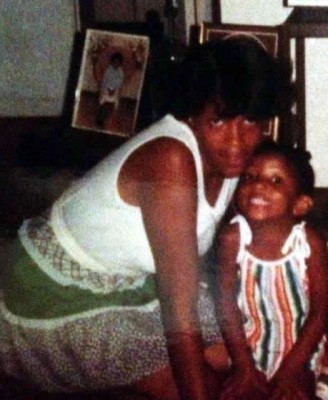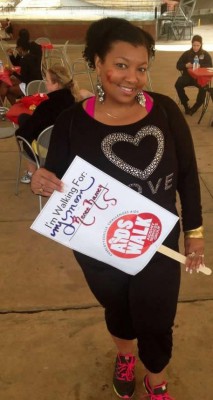It took Teshema Anderson a long time to feel comfortable telling people how her mother died.
A well-dressed, professional-looking woman with a beaming smile, happy family and successful career who speaks openly and with conviction, it’s hard to believe she ever felt scared of anything. But when it came to her mother, she did.
“It was really scary for me to tell anyone,” she admits. “Some of my friends knew, my husband knew, my daughter knew, but other than that no one knew what my mom died of.”
HIV/AIDS still carries a stigma. “I felt like that stigma would be attached to me; I didn’t want to be out sipping off drinks and people feeling uncomfortable. People think the craziest things when it comes to it.”
Then Teshema started working at UVA’s Infectious Disease Clinic — which houses the Ryan White Program — where she found that, “Everyone is warm and welcoming and cares about each patient,” and she discovered a newfound courage to share her story.
“Now it’s different: I’m not ashamed. I can say, ‘I’m Teshema. I had a mom, she passed away, and this is how she passed away. My mother died of AIDS.’”
A Mother Lost: Dying from AIDS

It was 1997. Teshema was 17 when her mother called with the news.
“I knew before she said it,” Teshema says. “She’d been in the hospital with chronic pneumonia and was getting smaller.”
Her mother had been afraid to tell Teshema that she had AIDS. “I told her, ‘I don’t care. I’m going to love you regardless of anything you tell me.’”
Ten years later, her mother was taking so many pills every day she told her daughter that she was “done. She was looking for my permission to give in, and I gave it to her. She just wanted to make sure that I wouldn’t hold it against her or be upset that she had decided not to fight anymore. So she stopped taking her medicine. She wouldn’t eat. They would try to give her IV fluids, and she would pull it out. Her sisters, brother, they all wanted her to fight. I knew she was exhausted.”
Teshema’s mom died at just 43 years old. She and a sibling who died from AIDS had both used crack cocaine — a behavior that doesn’t expose a person to HIV, but can lead to risky activities that do.
“I found her crack pipe when I was 12,” Teshema says. “I knew what it was.” By 13, she and her mother were evicted; by 14, Teshema was living with relatives.
“When I was young, I thought if she loved me enough she would stop this drug. It’s crippling to think your parent would choose drugs over you. As an adult, I know my mom loved me, and she did the best she could. If it was that easy, she would have stopped to save herself.”
Working at the Clinic: AIDS in Charlottesville
Teshema glows when she talks about the Infectious Disease Clinic. From the start, “Everyone was warm and welcoming, and it’s very exciting to know all the things going on here. Everyone I know loves their job. They care about their patients more than any clinic I’ve been in. They are completely dedicated and loving. From the front desk staff to the doctors, they do whatever they can to keep patients in care.”
For example, the clinic gives patients who are homeless cell phones to stay in contact with the clinic. The patients can come in to charge them when they need to.
She felt it was a kind of kismet that she got the job. While the clinic treats a range of conditions, from Hepatitis C and staph infections to shots for people traveling overseas, the majority of the 25-50 patients seen on a daily basis are HIV positive.
But most people don’t know that. Teshema notes that HIV/AIDS lacks the visibility it once had when more people got sick and died from the disease. Now, “No one thinks it can happen to them. They think, ‘It’s not in Charlottesville. It’s a wealthy town; even the poor people are OK here. It’s not DC or NY. We’re doing OK; Cville is doing OK. It’s not here.’ But it is here.” And they are people from all walks of life — people no one would guess were infected.
“Patients come into the clinic both white and black, every segment of the population,” including lawyers, professors, and doctors who travel from out of town, so nobody in their own circles will see them.
These are the people who “come in and have the means to support themselves and they’re functioning and making it.”
Then there are people who remind her of her mother. “They come in when they want to. It’s not something they want to accept.” Like her mother, “They don’t eat properly or take care of themselves in any way. It’s just they would rather be getting high.”
She does see a huge population of African-American women. “I hate to say it, but it seems like it’s the last thing on their minds. Condom use – not something they buy, do, they don’t prepare. They just don’t believe they feel it can happen to them.
I hate to be the person who says, ‘Well you know my mom died of AIDS, it IS possible,’ but I do talk to my friends about it. It’s disheartening and scary that most people don’t know they have it.”

AIDS Walk: Grief and Memory
Every day, as Teshema grieves the loss of her mother, she meets patients at her clinic and watches friends make risky decisions. “Every day is hard,” she says, tears in her eyes. “A disconnect and a loneliness. I have never experienced a loss like that before in my life. I just felt like the person that loved me best was gone.”
Since coming to the clinic, “I felt the love of that community. And I feel a strength that I didn’t know was there, a passion that I didn’t really ever know. I feel I’m honoring her. It helps me heal.”
As part of this honoring and healing, Teshema participated in her first-ever AIDS walk this October, a fundraising event for the local Aids Services Group (ASG). Her teenage daughter joined her. “The AIDS walk meant so much to me, it was one step towards healing — being able to say my mom dealt with this, and she had it, but that’s not all who she was. I’m going to honor her. And make sure that my children understand that this is something that is important.”
And what next? “I sent in my volunteer application already with ASG,” Teshema says proudly. “Seeing how much support, love, and passion, people not ashamed or afraid, really convinced me it’s not something to hide in the shadows. It felt really good. I saw smiling faces. Even though HIV/AIDS is a very serious thing, you got a sense of love from the walk, and acceptance. I wanted to be part of that.”
What Will You Do to Prevent HIV/AIDS?
Get tested; get involved:
- Visit Charlottesville’s ASG for an open house celebration this Saturday on World AIDS Day
- Find out more about the Ryan White clinic in yesterday’s blog post.

Wow, this warmed my heart. We literally share the exact same story. I am a student at Spelman College, and I am working on a program on deconstructing stigma around HIV and Black women. I would love to speak with you for any advice.
I admire you so much, to go through everyday you seem so happy with life and family now knowing what you went through with your mom, makes you even stronger. I am so happy that you proudly speak of her and how much you loved her. I am also proud of you and your weight loss you look wonderful, I wish you happiness and wellness
Hi there I’m so sorry About your mom I’m from. San Francisco My mother passed away in April of 92 when I was 13 she too asked me permission to give up she was holding on only for me I still have mental difficultes as you know we will never get over something so sad but her birthday is next Wednesday and your heartfelt story was found online for a reason. God Bless